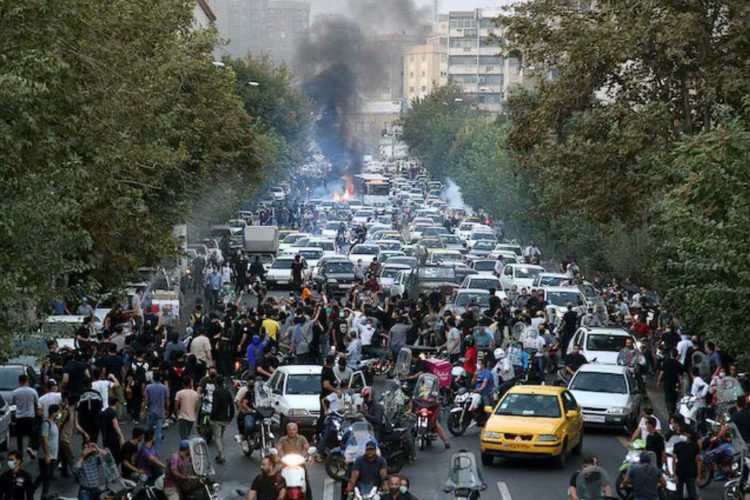It looks like a war, a war between arrogance and freedom in IRAN#Mahsa_Amini #مهسا_امینی pic.twitter.com/DjPXXRcNEj
— 🏴 Rhara 🏴 (@iam_rhara) September 22, 2022
Iranian “morality” police continue to arrest women.
Please wait a minute and look at the pictures.
Yes. Iran..
Because #مهسا_امینی #Mahsa_Amini #OpIran pic.twitter.com/gtx8AUEFlL— Meleğim 🧚♀️ limit (@melegimsta) September 22, 2022
In Kerman city centre, protesters directly confront riot police and plainclothes officers, preventing them from beating and arresting fellow protesters, on the fifth day of unrest in Iran sparked by the death of Mahsa Amini in morality police custody.https://t.co/8KfgjRvTYz
— Shayan Sardarizadeh (@Shayan86) September 21, 2022
Photos obtained by @AFP outside of Iran show Iranian demonstrators protesting in Tehran on September 21 in support of Mahsa Amini, who died after being arrested by the morality police.
Police used tear gas and made arrests to disperse protesters, official IRNA news agency says pic.twitter.com/hozkxTzlFP
— AFP News Agency (@AFP) September 22, 2022
Women are cutting their hair and burning hijabs.
#Iranian men and women in different cities of #Iran are holding a scarf burning ceremony in protest against the #mandatory_hijab.
#Mahsa_Amini
#مهسا_امینی pic.twitter.com/hd06HzqIIv— Ahmad Batebi (@radiojibi) September 22, 2022
Unprecedented scenes in Iran: woman sits on top of utility box and cuts her hair in main square in Kerman to protest death of Mahsa Amini after her arrest by the morality police. People clap their hands and chant “Death to the dictator.” #مهسا_امینی https://t.co/2oyuKV80Ac
— Golnaz Esfandiari (@GEsfandiari) September 20, 2022
Starlink Steps In to Fight Censorship
Because of the widespread videos and images being shared by citizens, the Iranian administration said they even arrested foreigners who had a connection with the riots. At the same time, they blocked the nation’s Internet connection hoping that this would disrupt communication between organizers.
Then, on Monday, police started using live ammunition against protesters in the Kurdish region (especially those close to Amini’s home), according to Kurdish human rights organization Hengaw. To date, three people were killed in police attacks, while dozens have been injured as they were faced with tear gas and water cannons.
It was reported that middle-class professionals, farmers, and teachers had taken the streets to call out the nation’s strict policies on women.
President Ebrahim Raisi, a cleric elected last year, supported strict enforcement of the country’s Islamic dress code. Raisi called the Interior Ministry to investigate Amini’s death and has reached out to her family to express his condolences. However, protesters are still asking him to resign.
“Iran continued a digital cat-and-mouse game with protesters, blocking internet connections in the areas of demonstrations, only to have people leave that area to get a signal—and then return to the protests.”
When it comes to oppressive governments, citizen journalism is one of the most critical aspects of fighting undemocratic authorities. So, Elon Musk said that Starlink, his internet company, would temporarily seek an exception to sanctions to allow access to their Internet connection services in Iran.
Iran has also blocked the encrypted messaging app, Telegram, but citizens are finding ways to bypass the restriction. Twitter and Facebook were also blocked in 2009.
“People are using circumvention tools to access Telegram who might not normally use them,” said Collin Anderson, a Washington, D.C.-based researcher who studies internet infrastructure and human rights. “And that is giving them access to a much wider internet.”
With Starlink’s access, this will empower more citizens to document abuse from the government and the police. Raisi is attending the UN conference in New York this week, but he has not responded yet to comments about Amini’s death and the ongoing debasement of freedom of speech in the country.










COMMENTS